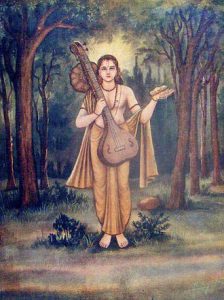By Ted Schmidt
One of the chief critiques often hurled at Vedanta is that it is merely intellectual, that it is dry and devoid of heart. This critique, however, is wholly unjustified. In fact, the very foundation of Vedantic self-inquiry is bhakti, or devotion.
It should be understood, however, that truly speaking love, the purest form of which is devotion, is not in its essence the exhilarating emotion it is romantically portrayed as and in whose name intimate relationships of diverse character are universally pursued. Love is simply focused attention. On an exoteric level (i.e., within the context of vyavaharika satyam, the seemingly dualistic empirical reality), we love what we pay attention to. In other words, the focus of our attention betrays or indicates what we love. On an esoteric level (i.e., from the perspective of paramarthika satyam, absolute reality or pure awareness), we can simply say that we are love, that, in fact, love is all there is. For love is attention, and attention is awareness. And since what we are in essence—what indeed everything is in essence—is awareness, love is the essential nature of reality, the “substanceless substance” that is the universal self.
Thus, even dry old pedantic Vedanta is love.
In practical terms, love lies at the heart of Vedanta as well. Only by virtue of focused attention will one be able to imbibe and assimilate the teachings that reveal the true nature of reality. For one thing, the non-dual nature of reality is counter-intuitive due to the fact that maya, or ignorance, projects such a convincing virtual dualistic reality. Additionally, the overlay of conditioning that we as apparent individuals are subjected to from every sector of the apparent reality—parents, school, community, church, government, and media—is so intense that we need a strong constitution, what Vedanta calls mumukshutva, a burning desire for freedom from ignorance, in order to withstand and overcome the constant barrage of obstacles that we as seekers of self-knowledge inevitably face on our quest for understanding and truth. This burning desire can only be characterized as love. In fact, it is essentially the self, limitless awareness, whose nature is love, seeking to know itself through the vehicle of the antahkarana (i.e., mind or intellect) of the apparent individual with whom it has become associated due to the power of maya. Therefore, self-inquiry is nothing but the self engaging in an apparent love affair with itself, an affair that is consummated by the knowledge that negates any and all sense of separation and reveals the singularity of all existence.
It is in this sense that jnana and bhakti are one.

